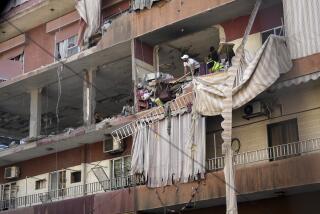Anti-Arab Vigilantism by Settlers Stirs Concern
- Share via
JERUSALEM — When U.S. Secretary of State George P. Shultz flew from Israel to London on Tuesday in his continuing search for Middle East peace, he left behind an almost tangible sense that the 12-week-old Palestinian uprising in the occupied West Bank and Gaza Strip is building toward a possibly fateful turning point.
The question is whether political moves can ease tensions before street confrontations result in an explosion that could foreclose peaceful options.
Of most immediate concern is what security sources here say is the growing threat of bloody confrontations between the 1.4 million Arab residents of the territories and the nearly 70,000 Jews who live among them.
“The potential danger for this kind of collision is enormous,” a senior Israeli military officer told correspondents traveling with the Shultz party. He said fatal clashes between Arabs and settlers would be “more dangerous than confrontations with the Israel Defense Forces.”
While vastly outnumbered, the Jewish settlers are well armed with army-issued and -licensed private weapons. They have already been implicated in five of at least 76 unrest-related Palestinian fatalities in the territories since the trouble began last Dec. 9.
Still, according to the army, the incidents to date have been isolated and in all cases provoked by a direct attack on the settlers by Palestinians throwing stones or firebombs.
What concerns security forces now is an apparent trend toward settler vigilante actions meant to intimidate or punish entire Palestinian villages.
“I can see the day a Jewish boy will be injured and 2,000 people will go out to wage a pogrom (massacre),” Ariel resident Israel Kedem warned Monday during a meeting of the settlement’s security officers with Deputy Israeli Defense Minister Michael Dekel.
Infant Hurt by Rock
Kedem’s comments followed an incident last Friday in which 15-month-old Michael Ben-Hur suffered a concussion when he was hit in the head by a rock thrown at his parents’ car on the main road to the big Maaleh Adumim settlement east of Jerusalem.
In another incident, Western photographers said Tuesday that they saw three men, believed to be settlers, firing randomly and without provocation into alleys and sides treets of Beita, a village just south of Nablus.
“I think there is a certain amount of frustration as to why this thing is dragging on,” said Chaim Makovsky, a spokesman for the nationalist Gush Emunim (Faith Bloc) settlement movement.
Makovsky confirmed that Gush Emunim is distributing a letter on the West Bank warning Palestinians that continued violence “will . . . bring destruction upon you.”
The letter urges “our Arab neighbors” not to be misled by what it termed “the Israeli army’s indulgence.”
“The moral and humane behavior which you enjoy at our discretion is not a result of weakness,” it added. “We measure our behavior by divine standards and are put off by the barbaric measures of suppression of the Arab leaders. . . . “
Still, it warned, “don’t . . . think that we are turning the other cheek. The days when Jewish blood was cheap are long gone.”
The Palestinians, however, appear in no mood to end their protests. On the contrary, correspondents have found an almost euphoric mood in virtually every site that they have visited in the territories lately--a combination of new-found pride and a sometimes exaggerated sense of what the Palestinians have accomplished.
“The blood of the young people is very high,” said Izdihar Jabiri, a 20-year-old student from the El Arrub refugee camp near Hebron, where three Palestinians have died from army gunfire. “If we were ready to sacrifice one person, now we’re ready to sacrifice 10 or 20.”
The Palestinian mood was reflected in the latest leaflet distributed by the self-styled Unified National Leadership for the Uprising in the Occupied Territories, which was distributed Tuesday.
“Your glorious uprising continues, and your heroic confrontations to the occupying army and the cowardly settlers increases,” the underground leaflet reported enthusiastically.
Among other actions, it called for “escalating the war of attrition against the occupiers and cutting off the roads to settlements.”
“Sooner or later one expects there will be a head-on confrontation” with the Jewish settlers, Palestinian political scientist Sari Nusseibeh said in an interview Tuesday. In any such clash, the Palestinians “are going to be the party that loses” because they are unarmed, he added.
‘Fantastic Achievement’
Nusseibeh said the uprising has been “a fantastic achievement” for the Palestinians in the territories.
Now, he said, “it has to be coupled with just as imaginative and daring a political offensive.”
Differences among the Palestinians about how to capitalize on the uprising, as well as distrust of Israel’s good will, have stymied any political initiative from their side, however.
Local Arab leaders, including Nusseibeh, refused to meet with Shultz here last week, arguing that any such session must also involve representatives of the Palestinian Liberation Organization.
Contacts between the Americans and Arab leaders are reportedly continuing, however.
“I don’t think it’s too late,” said Nusseibeh. Neither, he added, is it too early for a Palestinian political gesture. “As far as the present form of the uprising is concerned, we are probably beginning to reach a point where we will have diminishing returns.”
Nusseibeh envisions a meeting with Shultz resulting in some concessions from the Israeli side.
That could be followed by a dramatic statement by the PLO “to convey to the Israeli man in the street in clear, unambiguous language, what is already in fact part of the PLO credo--namely, that a solution can be found by establishing an independent Palestinian state alongside Israel rather than instead of Israel.”
More to Read
Sign up for Essential California
The most important California stories and recommendations in your inbox every morning.
You may occasionally receive promotional content from the Los Angeles Times.










